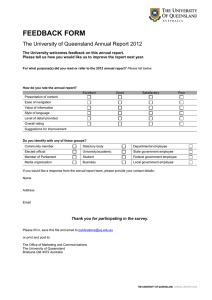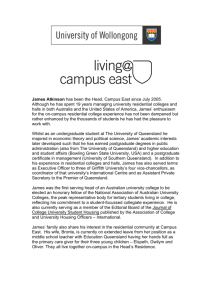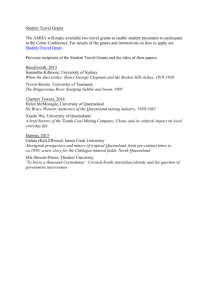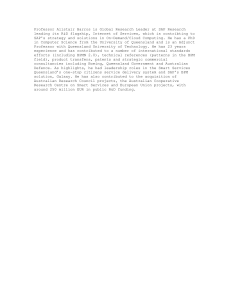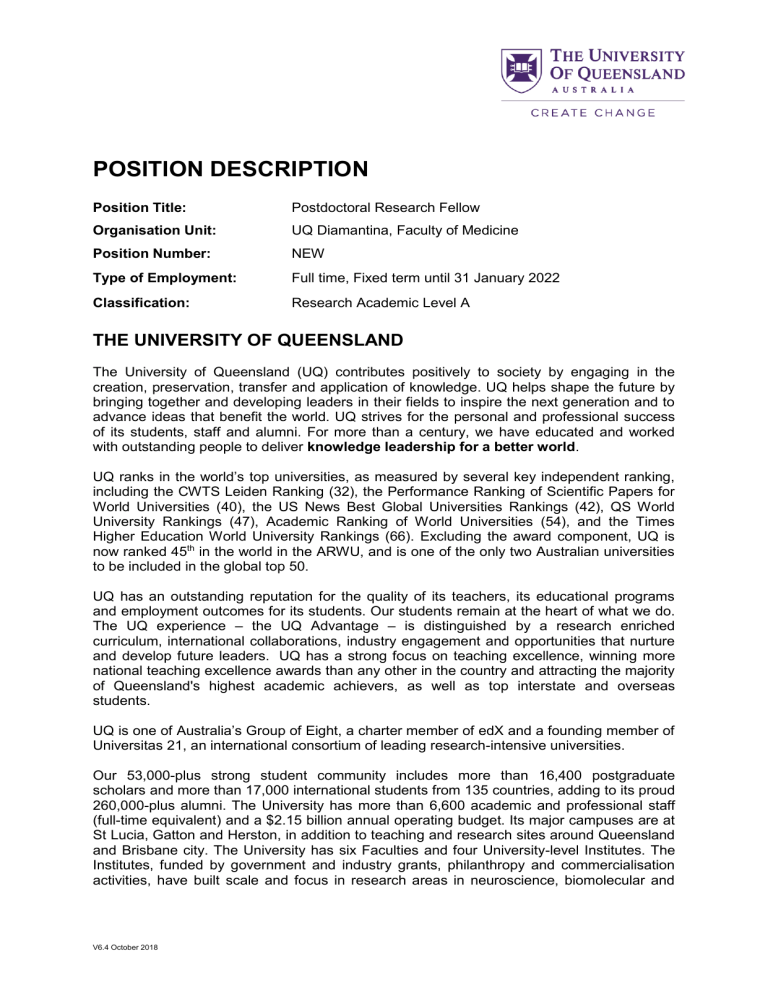
POSITION DESCRIPTION Position Title: Postdoctoral Research Fellow Organisation Unit: UQ Diamantina, Faculty of Medicine Position Number: NEW Type of Employment: Full time, Fixed term until 31 January 2022 Classification: Research Academic Level A THE UNIVERSITY OF QUEENSLAND The University of Queensland (UQ) contributes positively to society by engaging in the creation, preservation, transfer and application of knowledge. UQ helps shape the future by bringing together and developing leaders in their fields to inspire the next generation and to advance ideas that benefit the world. UQ strives for the personal and professional success of its students, staff and alumni. For more than a century, we have educated and worked with outstanding people to deliver knowledge leadership for a better world. UQ ranks in the world’s top universities, as measured by several key independent ranking, including the CWTS Leiden Ranking (32), the Performance Ranking of Scientific Papers for World Universities (40), the US News Best Global Universities Rankings (42), QS World University Rankings (47), Academic Ranking of World Universities (54), and the Times Higher Education World University Rankings (66). Excluding the award component, UQ is now ranked 45th in the world in the ARWU, and is one of the only two Australian universities to be included in the global top 50. UQ has an outstanding reputation for the quality of its teachers, its educational programs and employment outcomes for its students. Our students remain at the heart of what we do. The UQ experience – the UQ Advantage – is distinguished by a research enriched curriculum, international collaborations, industry engagement and opportunities that nurture and develop future leaders. UQ has a strong focus on teaching excellence, winning more national teaching excellence awards than any other in the country and attracting the majority of Queensland's highest academic achievers, as well as top interstate and overseas students. UQ is one of Australia’s Group of Eight, a charter member of edX and a founding member of Universitas 21, an international consortium of leading research-intensive universities. Our 53,000-plus strong student community includes more than 16,400 postgraduate scholars and more than 17,000 international students from 135 countries, adding to its proud 260,000-plus alumni. The University has more than 6,600 academic and professional staff (full-time equivalent) and a $2.15 billion annual operating budget. Its major campuses are at St Lucia, Gatton and Herston, in addition to teaching and research sites around Queensland and Brisbane city. The University has six Faculties and four University-level Institutes. The Institutes, funded by government and industry grants, philanthropy and commercialisation activities, have built scale and focus in research areas in neuroscience, biomolecular and V6.4 October 2018 biomedical sciences, sustainable minerals, bioengineering and nanotechnology, as well as social science research. UQ has an outstanding track-record in commercialisation of our innovation with major technologies employed across the globe and integral to gross product sales of $11billion+. UQ has a rapidly growing record of attracting philanthropic support for its activities and this will be a strategic focus going forward. Faculty of Medicine The University of Queensland’s Faculty of Medicine is an internationally recognised provider of world-class education and research. The research-intensive Faculty has a gross budget of almost $300 million, employs approximately 1000 continuing and fixed-term staff (headcount), has a community of more than 4000 non-salaried academic appointees and around 3200 students (headcount). The Faculty of Medicine offers Australia’s largest medical degree program for graduates and school-leavers. Undergraduate and postgraduate programs are available in the disciplines of Medicine, Health Sciences, E-Health, Mental Health, Biomedical Sciences and Public Health. The Faculty possesses enormous strengths spanning research, teaching, industry engagement and clinical practice in disciplines ranging from the basic sciences, biomedical research and development, to clinical trials and public health. Research projects within the Faculty have already led to discoveries with far-reaching social and economic impacts, including the revolutionary Gardasil (TM) vaccine for cervical cancer (Professor Ian Frazer) and a drug discovery EMA401 (Professor Maree Smith), a first-in-class oral treatment for chronic pain which through Spinifex Pharmaceuticals led to Australia’s largest biotechnology commercialisation deal. Faculty staff include three highly cited authors, one Fellow of the Royal Society (FRS), three Fellows of the Australian Academy of Science (FAA) and 12 Fellows of the Academy of Health and Medical Sciences (AAHMS). The Faculty is a core member of Brisbane Diamantina Health Partners, the Brisbane-wide academic health science system. Educational offerings in biomedical sciences, medicine and public health are informed and supported by research activity across a range of fundamental and clinical areas of importance including recognised strengths in cancer, skin diseases, brain and mental health, maternal and child health and genomics. Cutting-edge facilities such as the Herston Imaging Research Facility (HIRF), the UQ Centre for Clinical Research (UQCCR), our laboratories in the Translational Research Institute (TRI) and the new Centre for Children’s Health Research (CCHR) enable outstanding research outcomes and sharpen our understanding of cancer, autoimmunity, mental disorders, infectious diseases and neurological disease. Further details are available at www.medicine.uq.edu.au. The University of Queensland Diamantina Institute The University of Queensland Diamantina Institute (UQDI) was established in 2007 and forms a major research centre within the Faculty of Medicine. The aim of the Institute is to develop a better understanding of the molecular and cellular basis of disease, and to translate that understanding into practical outcomes for patients. Based at the Translational Research Institute (TRI) at the Princess Alexandra Hospital teaching campus in Brisbane, UQDI has more than 300 researchers, clinical academics and students who work closely with hospital clinicians in the themes of Cancer, Immunology and Genomic Medicine. UQDI V6.4 October 2018 has particular research strengths in skin cancer, cancer cell biology, cancer immunotherapy, vaccine development and nanotechnology, autoimmunity and the genetic basis of disease. UQDI has a mission of translating discoveries into better treatments and has a strong record of achievement, most notably in the development of cancer therapies: research at UQDI by Professor Ian Frazer AC FRS led to the development of the cervical cancer vaccine Gardasil. UQDI is the largest partner in the TRI, which is an extremely well-equipped translational biomedical research institute, with outstanding laboratories and core facilities for tissue imaging, microscopy, flow-cytometry, proteomics and in vivo models of disease. Its close affiliation with clinical units at Princess Alexandra Hospital provides UQDI with a significant strategic advantage in near-patient, translational research. Details of the research interests of academic staff may be accessed on the Institute’s web site at at http://www.di.uq.edu.au/research. Australian Skin and Skin Cancer (ASSC) research Centre The University of Queensland is the founder with QIMR-Berghofer Medical research institute of the ASSC. This centre regroups 40 research team around the themes of skin, skin cancer and melanoma with a multidisciplinary approach to tackle global problems. It encompasses epidemiology, population genetics, clinical dermatology and surgical oncology, molecular and cellular biology as well as immunology and state of the art technologies applied to these common problems resulting in a world class environment for skin research. For the past few years the University of Queensland is the leading academic institution for dermatology research and the ASSC is on par in terms of publications and citations with some of the world-renown medical and dermatology centres internationally. Information for Prospective Staff Information about life at UQ including staff benefits, relocation and UQ campuses is available at - http://www.uq.edu.au/current-staff/working-at-uq The University of Queensland Enterprise Agreement outlines the position classification standards for Levels A to E. DUTY STATEMENT Primary Purpose of Position To engage in internationally competitive research in the area melanoma skin cancer to identify predictive biomarkers, assist with postgraduate student supervision, and publish or exhibit in high quality outlets. Duties Duties and responsibilities include, but are not limited to: Research Conduct internationally competitive research in the area melanoma skin cancer to identify predictive biomarkers for progression in tissue using cutting edge tools such as spatial transcriptomics/proteomics and multiplex/multi-spectral imaging; Present results of research at meetings, and publish or exhibit in high quality outlets; Abide by human ethics rules as approved and prepare annual reports for ethics committee. V6.4 October 2018 Contribute the development of a research programme including participation in applications for external funding; Work with colleagues and postgraduates in the development of joint research projects; Acquire and maintain familiarity with relevant scientific literature and contribute a strong and independent academic approach to the work Contribute to safe laboratory working environment Teaching and Learning As a ‘Research focussed’ position there is no formal requirement for undergraduate teaching. However, it is encouraged that you seek teaching opportunities. Participate in events to attract postgraduate students to the Institute, Assist with supervision of graduate and post-graduate students engaged in research and other members of the team Service and Engagement Perform a range of administrative functions at your level in the Institute Share in academic service responsibilities, contribute to the outcomes of internal committees Foster the Institute’s relations with industry, government departments, professional bodies and the wider community Any other duties as reasonably directed by your supervisor Other Ensure you are aware of and comply with legislation and University policy relevant to the duties undertaken, including but not exclusive to: the University’s Code of Conduct requirements of the Queensland occupational health and safety (OH&S) legislation and related OH&S responsibilities and procedures developed by the University or Institute/School the adoption of sustainable practices in all work activities and compliance with associated legislation and related University sustainability responsibilities and procedures requirements of the Education Services for Overseas Students Act 2000, the National Code 2007 and associated legislation, and related responsibilities and procedures developed by the University Organisational Relationships The position reports to Professor Kiarash Khosrotehrani, Professorial Research Fellow. SELECTION CRITERIA PhD in the area of molecular/cellular biology with a particular emphasis on bioinformatic analysis or a related discipline V6.4 October 2018 Experience in liaising and collaborating with colleagues to develop co-operative research initiatives Demonstrated expert knowledge in the area of Python and R programming and other informatic tools Demonstrated knowledge in the area of molecular/cellular biology, next generation sequencing; preferably the candidate should have experience with single cell RNA sequencing or other single cell high-throughput technologies. Knowledge of biostatistics and analysis of genomic, transcriptomics datasets Demonstrated experience working with RNA, cryosectioning, immunostaining, and microscopy Evidence of a contribution to research, including high-quality research publications Ability to work collaboratively with colleagues Experience or willingness in supervision of undergraduate and postgraduate research students Evidence of independent research achievements Qualification Verification An appointment to this position is subject to the verification of the highest academic qualification from the conferring institution. Vaccinations and Immunisation It is a condition of employment for this role that if you are required now or in the future, to work or interact in Queensland Health clinical facility; or in an equivalent clinical health facility; or health care role; or will be required to perform work tasks that put you at risk of exposure to vaccine-preventable disease you are required to be immunised against, and remain immunised against, certain vaccine preventable diseases (VPDs) in accordance with the University’s Vaccinations and Immunisation Guidelines (PPL 2.60.08). The employee is required to provide evidence of immunisation against VPDs. The University of Queensland values diversity and inclusion and actively encourages applications from those who bring diversity to the University. Please refer to the University’s Diversity and Inclusion webpage for further information and points of contact if you require additional support. This role is a full-time position; however flexible working arrangements may be negotiated. Accessibility requirements and/or adjustments can be directed to recruitment@uq.edu.au. V6.4 October 2018
